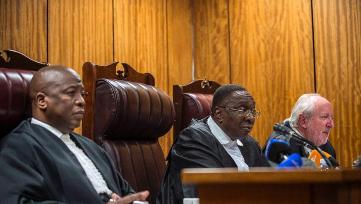South Africa says it will appeal high court ruling on Bashir
June 29, 2015 (WASHINGTON) –South Africa will file an appeal to a ruling handed down by a local court this month that accused the government of violating the constitution by not arresting Sudanese president Omer Hassan al-Bashir during his presence at the 2-day African Union (AU) summit in Johannesburg this month.

The government will first have request a leave (permission) to appeal from the High Court judges before it can proceed to the Supreme Court of Appeal. If the ruling is unfavorable then the government can take the matter to the Constitutional Court.
Last week, the North Gauteng High Court reprimanded the government for flouting its own laws saying that it has undermined the country’s constitutional democracy in allowing Bashir’s exit. It has previously ordered that the government prevent the Sudanese leader from leaving the country.
“A democratic State based on the rule of law cannot exist or function, if the government ignores its constitutional obligations and fails to abide by Court orders. A Court is the guardian of justice, the corner-stone of a democratic system based on the rule of law. If the State, an organ of State or State official does not abide by Court orders, the democratic edifice will crumble stone-by-stone until it collapses and chaos ensues,” presiding Judge Dunstan Mlambo said.
Mlambo also invited the National Director of Public Prosecutions (NDPP) “to consider whether criminal proceedings are appropriate”.
Bashir is wanted by the International Criminal Court (ICC) to stand trial on charges of genocide, crimes against humanity, and war crimes allegedly committed in Sudan’s western region of Darfur.
South Africa, as an ICC member, was obliged to arrest Bashir but chose not to on the grounds that he enjoys immunity as one of the delegations attending the AU summit. But the court dismissed this argument.
“The Immunities Act at its highest confers discretion on the Minister of International Relations to confer immunity, but she must exercise that lawfully. The state cannot rely on the African Union’s conventions to defend itself. That cannot trump South Africa’s obligations under the Rome Statute,” Mlambo said.
“The ICC does not give heads of state immunity. Therefore immunity is excluded or waived under the Rome Statute,” he asserted.
The court had also demanded an explanation on why Bashir was allowed to leave South Africa despite the interim court order barring him from departure.
The South African government explained in an affidavit filed last week that Sudanese officials had failed to present Bashir’s passport to the immigration officer at Waterkloof Air Force base.
“Two representatives of Sudan, in the company of the protocol officer from the Department of International Relations and Cooperation (DIRCO) handed a set of passports to the department of home affairs immigration officers,” the director general of the Department of Home Affairs Mkuseli Apleni said in the filing.
“After receipt of the passports, the immigration officer first of all checked to determine whether any of the passports belonged to President Bashir. The immigration officer concluded that the passport of President Bashir was not among the passports provided”.
The South African official asserted that as a result “it would then appear from the above that President Bashir departed from the republic without his passport presented to the immigration officer by the two Sudanese representatives who were accompanied by the protocol officer of DIRCO. The latter contention is fortified by the fact that verification on the passport details of President Bashir against the movement control system of the department of home affairs reveals that president Bashir indeed entered the Republic of South Africa but there is no record of him leaving the republic”.
South Africa’s largest opposition party, the Democratic Alliance (DA) criticized the government’s move to appeal.
“Instead of government being accountable, once again we see more public money being spent on appeals to evade the consequences of unlawful actions,” Democratic Alliance federal council chairperson James Selfe said in a statement.
“Although it is presently unclear what the state plans to argue, one thing is clear from the judgment handed down in this matter: the South African government was simply in contempt of court”.
“By not respecting the Rule of Law, and equality before the law, government is setting the worst possible example for citizens. Members of Cabinet now sit in meetings and effectively decide that certain people, most often friends of President Jacob Zuma, are above the law”.
The South African government has suggested last week it could decide to withdraw from the ICC “as a last resort” if its proposed reforms in the court’s Statute are not implemented.
(ST)
